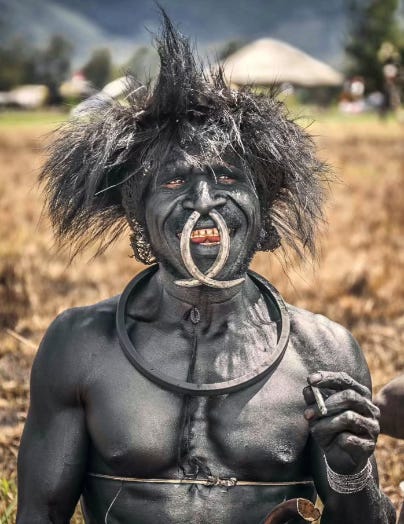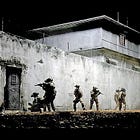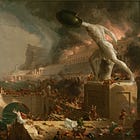How Warrior Cultures Teach Us to Face Suffering Without Blame
Epictetus, Stoicism, and the Warrior Wisdom of the Mae Enga

I study pre-state warriors because they have a way of turning my mind’s eye inward and shattering my perspective.
Suddenly, I no longer restrict my view of existence to my immediate surroundings—concrete roads, smart phones, seething news, emails, safety, a lifetime of memories. I am struck by the radically different way of life of our primal fighters. My hands part the decades-old assumptions in my mind and peer into the millennia-old corners of my consciousness: it is a place that feels strangely organic, real, grounded, meaningful.
This is what I think of as “primal recall.” This is a concept the modern world is in dire need of.
If an irony is defined as the delta between surface level and reality, then the human of the modern world is the most ironic animal on earth, given how far removed minds are from the Laws of Nature and Nature’s God.
One symptom of this ironic way of life is blaming, or holding others responsible for our own suffering.
My point is the existential clarity of the ancient world has a way of negating the chaotic irony of the modern.
I was reading about the Mae Enga, a warlike people of the western highlands of New Guinea, and I was blasted by primal recall: they would not tolerate modern sentiments about suffering and blaming.
Mae children are not only taught the physical realities of war, but the existential realities. When one clan is at war with another in valleys beneath the sun, boys with little spears soak in the scene from a grassy piece of high ground. Some may even be invited to join the rear at ground level and see the arrows and spears thrown from the sinewy limbs of their fathers and brothers whose faces are painted black and red with soot; they may get to see the menacing, feline-like movements of the enemy through the high grass a stone’s throw away.
It is here a boy may get shot by an errant arrow in his forearm or calf. And it is here we peer into an ancient mode of life far removed from our own. The boy is pulled to safety and the arrow carefully pulled out. Parents are primed for this moment, knowing they only have a few precious seconds before tears, screams, and blaming can take hold of the child’s mind.
The child is told: “This is what life is all about... Sooner or later everyone suffers minor wounds.” And then the parents drop the hammer—they tell the child this is no more than “the work of the sun.”1
Pre-state warriors and non-warriors alike measure their worth by how well they can suffer. It therefore makes sense they are able to pack an entire philosophy of existence into five syllables.
Why then does this expression matter in the modern world?
The work of the sun.
It is a more elegant and existential way of saying “Shit happens,” and it is this existential thread I want to pull on.
It means our role in the cosmos is clear: you will suffer in life. Your suffering will be physical, psychological, emotional, spiritual. It will hurt. It will not make sense at times. It will seem cruel and unbearable. And then you will die.
But your response to suffering is what defines you in your time on this earth.
Mike Tyson said “Everyone has a plan till they get punched in the mouth.” I would only add that this astute observation of the human condition is only applicable to the modern human condition. It is now possible for our plans to bear zero semblance to reality because we may never get punched in the mouth or shot by an arrow when we are wrong. This is good. But it is also where blame comes from when modern plans shatter on the ancient rocks of reality; the black pit of denial in which blamers hold their suffering like a shiny trophy in their palms and point at it screaming “Look at what you did to me!” hiding from ownership, hiding from responsibility, hiding from themselves.
Imagine we find ourselves sitting in the grass with an arrow in our calf, or with a bloody lip, or having a bad day. We look up at the gnarled Mae matriarch standing over us and she says “It is the work of the sun.” Suddenly the Victim Olympics is put out of business. What more poetic expression exists to describe all those things that lie outside our control?
Yes, we may find fault with those who wrong us, those who are guilty, or evil, or both. No, the Mae would say, we may not place the final responsibility for what happens to us on anyone else.
It is this savage warrior wisdom that cuts like a knife of logic through the contradictions and lies and bullshit we humans love to scramble our brains with. We can no longer blame the sun, the enemy, a stranger, a parent, a friend, a politician, a corporation, a government, a God.
But what is the ultimate foundation of this warrior wisdom—of all warrior wisdom? The truth, usually dripping with irony, that if we do not want to take responsibility for our suffering, we do not have to. I explored this concept in another essay on SEAL training and World War II:
The point is we can choose not to exist if we do not like the work of the sun. This primal theme evolved into a Stoic theme. The Stoic grandmaster Epictetus said “Remember that the door stands open,” a reminder that most of our grievances are not so bad after all compared to death. This is also what Nietzsche meant when he said the mere thought of suicide has saved many lives.
This grimly mocking perspective reminds us life is a sacred fucking gift.
The modern world, on the other hand, in its hubris and privilege and affluence, rarely ever needs to contemplate this.
Let us bring this aspect of the Mae culture into our own era.
Those who blame all but themselves for their health, their debt, their unhappiness, and their existential angst when it finally dawns on them that their dreams of easy six pack abs and Italian villas may never be fulfilled—they can remember their suffering is a choice. You and I when everything goes wrong all at once: late for work, tripping over the dishwasher door, stubbing a toe on a floorboard, only for our coat to get stuck on the screen door and yank us around and make us look like complete fools—we too can remember it is a choice.
The truth is we can hold no one responsible for our suffering for two reasons: existence is defined by suffering, and we choose to exist.
How liberating. How primally empowering.
Let us use suffering to tap into our primal recall, that ancient chamber of the mind filled with mud, and campfires, and the wisdom of leathery-skinned elders reminding us our worth in life is measured by no more than our ability to suffer, and suffer beautifully.
If you found value here, please consider adding a like, restacking, and sharing this post.
And if you feel called to support my mission, please consider supporting What then?
Meggitt, Mervyn J. Blood Is Their Argument: Warfare Among the Mae Enga Tribesmen of the New Guinea Highlands. Mayfield Publishing Company, 1977







Someone not too far in the past that embodied “it’s the work of the sun” was Vice Admiral James Stockdale. He was the senior officer POW in the North Vietnamese prison system and ostensibly spent most of his captivity in the Hanoi Hilton. By his own account one day a Naval Aviator and one of the best, “cock of the walk” and next shot down and would spend the next seven years in a unique Hell. Rather than submit and relent he choose to lead those around him, and he refused to allow himself to used as a propaganda tool. Moments before he was to be paraded before news cameras and asked to humiliate himself and his brethren he smashed his head against a stone wall and so badly lacerated his head that he could pull his scalpe away from the skull. “Here assholes let’s go to the cameras now…” he terrified his captors. What sort of man would do this to himself. Well start with stoic! He was, Sam as you likely know, awarded our nations highest award and decoration for valor, The Medal of Honor. But he would not stop there, he would come home finish his navy career and go one to teach an ethics class at Harvard Business School. (Can you imagine the losers in that classroom when the old boy walked in and surveyed that motley lot! Holy Phuck!! I get the giggles just thinking on it!!) He would stun the voting population of America when at the opening of the vice presidential debate in 1992 he opened his remarks with the now infamous line “Who am I, and why am I here?” The dullards of the press and political class mocked him, they didn’t have a clue about what he was on to, but he did, and he cared less what the those safe in their beds at night thought of him. He had suffered “the work of the sun” and he taught those of us who would be interested enough to listen, that suffering is good, it’s a way of life, and when the moments of not suffering occur, that life is indeed precious, and pretty dandy!! Thanks again Sam for a GREAT reminder and post!!
I’m sorry, you’ve traumatized me, I have to retreat into a safe space. (… and reread Gates of Fire).